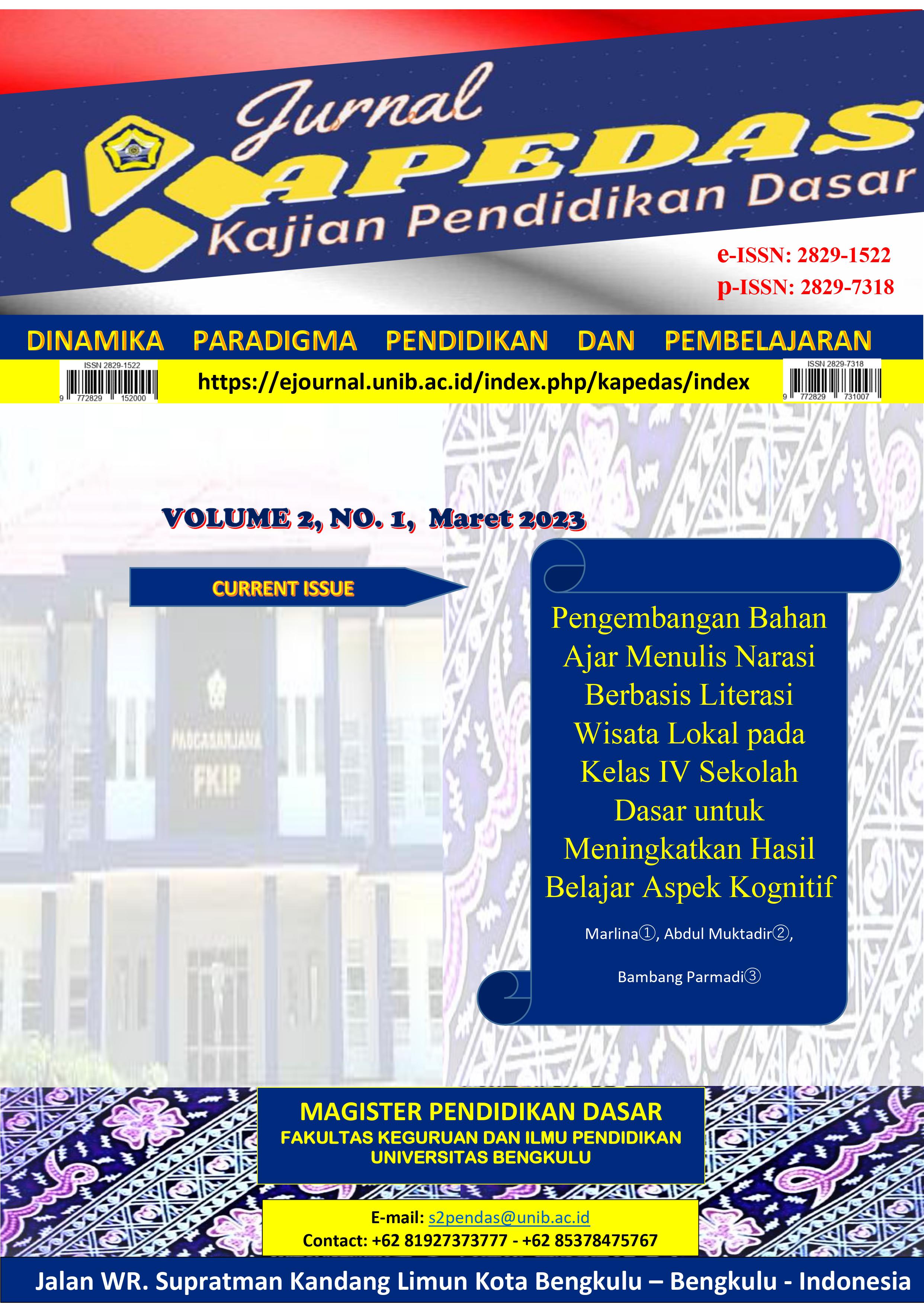Main Article Content
Abstract
This study aims to produce a story problem-solving-based module to improve the math literacy skills of fourth-grade students at SDN Mukomuko City. This research method is the Research and Development (R&D) method by modifying the 4D model. However, this research only reached the development stage, while the deployment stage could not be carried out due to time constraints, so this stage was not discussed in depth. Validation was carried out by material experts, linguists, and design experts. The modules developed were rated by the students and teachers of SDN 11 Kota Mukomuko. It was also tested on a limited basis at SD 4 Kota Mukomuko. Data analysis techniques using qualitative and quantitative descriptive analysis. The results of expert validation were tested with the interrater reliability test to see agreement between raters. The validation results showed the value of Aiken's V coefficient of each feasibility item for material experts, linguists, and design experts. stated to have high validity. Furthermore, the reliability of the material feasibility was tested, namely, at 72%, language feasibility at 80%, and design feasibility at 64%, and expert comments that the depth of the description was in accordance with the level of student development, paying attention to statements related to language, such as spelling, grammar, writing must be appropriate and use capital letters. the standard size and then the color of the text with a background color that lacks contrast. The product of the development of word problems problem-solving modules to improve students' mathematical literacy skills is very good for use by fourth-grade elementary school students.
Keywords
Article Details
Copyright (c) 2023 Elli Nurdahwati

This work is licensed under a Creative Commons Attribution-ShareAlike 4.0 International License.

Karya ini dilisensikan di bawah Creative Commons Attribution-ShareAlike 4.0 International License .
References
- Abidin, Y., Mulyanti, T., dan Yunansyah, H. (2021). Pembelajaran Literasi: Strategi Meningkatkan Kemampuan Liteasi Matematika, Sains, Membaca dan Menulis. Jakarta: Bumi Aksara.
- Antara, A.A.P. (2020). Penyetaraan Vertical dengan Pendekatan Klasikal Item Respon Theory (Teori Dan Aplikasi).Yogyakarta: Deepuplish.
- Ariani, Y., Helsa, Y., dan Ahmad., S. (2020). Model Pembelajaran Inovatif untuk Pembelajaran Matematika di Kelas IV Sekolah Dasar. Yogyakarta: CV Budi Utama.
- Arikunto, S. (2013). Prosedur Penelitian: Suatu Pendekatan Praktik. Jakarta: Renika Cipta.
- Fendrik, M. (2019). Pengembangan Kemampuan Koneksi Matematis dan Habits Of Mind pada Siswa. Surabaya: Media Sahabat Cendikia.
- Irawan, E. (2020). Deteksi Miskonsepsi di Era Pandemi. Yogyakarta: Zahir Publishing.
- Isrokatun., Hanifah, N., Maulana, M., dan Suhaebar, I. (2020). Pembelajaran Matematika dan Sains Secara Integratif Melalui Situation-Based Learning. Bandung: UPI Sumedang Press.
- Kanusta, M. (2021). Gerakan Literasi dan Minat Baca. Sumatera Barat: Azka Pustaka.
- McHugh, M.L. (2012). Interrater Reliability: The Kappa Statistic. Journal Biochemia Medica. (2012;223):276-82. National University. California.
- Mulyatiningsih, E. (2014). Metode Penelitian Terapan Bidang Pendidikan. Bandung: Alfabeta.
- Novferma. N. (2016). Analisis Kesulitan dan Self-Efficacy Siswa SMP dalam Pemecahan Masalah Matematika Berbentuk Soal Cerita. Jurnal: Riset Pendidikan Matematika. e-ISSN:2477-1503. Vol3 - No 1, Mei 2016, (76 - 87).
- Ojose, B. (2011). Mathematics Literacy: Are We Able To Put The Mathematics We Learn Into Everyday Use?. Journal of Mathematics Education. Vol. 4, No. 1, pp. 89-100. June 2011.
- Ruqoyyah, S. (2021). Pembelajaran Matematika di Sekolah Dasar. Jawa Barat: Edutrimedia Indonesia,
- Sugiyono. (2017). Metode Penelitian Administrasi. Bandung: Alfabeta.
- Widiyanto, M.A. (2013). StatistikaTerapan: konsep dan aplikasi spss/lisrel dalam penelitian pendidikan, psikologi dan ilmu social lainnya. Jakarta: Media komputindo.
- Yusuf, M dan Daris, L. (2019). Analisis Data Penelitian. Bandung: IPB Press.
References
Abidin, Y., Mulyanti, T., dan Yunansyah, H. (2021). Pembelajaran Literasi: Strategi Meningkatkan Kemampuan Liteasi Matematika, Sains, Membaca dan Menulis. Jakarta: Bumi Aksara.
Antara, A.A.P. (2020). Penyetaraan Vertical dengan Pendekatan Klasikal Item Respon Theory (Teori Dan Aplikasi).Yogyakarta: Deepuplish.
Ariani, Y., Helsa, Y., dan Ahmad., S. (2020). Model Pembelajaran Inovatif untuk Pembelajaran Matematika di Kelas IV Sekolah Dasar. Yogyakarta: CV Budi Utama.
Arikunto, S. (2013). Prosedur Penelitian: Suatu Pendekatan Praktik. Jakarta: Renika Cipta.
Fendrik, M. (2019). Pengembangan Kemampuan Koneksi Matematis dan Habits Of Mind pada Siswa. Surabaya: Media Sahabat Cendikia.
Irawan, E. (2020). Deteksi Miskonsepsi di Era Pandemi. Yogyakarta: Zahir Publishing.
Isrokatun., Hanifah, N., Maulana, M., dan Suhaebar, I. (2020). Pembelajaran Matematika dan Sains Secara Integratif Melalui Situation-Based Learning. Bandung: UPI Sumedang Press.
Kanusta, M. (2021). Gerakan Literasi dan Minat Baca. Sumatera Barat: Azka Pustaka.
McHugh, M.L. (2012). Interrater Reliability: The Kappa Statistic. Journal Biochemia Medica. (2012;223):276-82. National University. California.
Mulyatiningsih, E. (2014). Metode Penelitian Terapan Bidang Pendidikan. Bandung: Alfabeta.
Novferma. N. (2016). Analisis Kesulitan dan Self-Efficacy Siswa SMP dalam Pemecahan Masalah Matematika Berbentuk Soal Cerita. Jurnal: Riset Pendidikan Matematika. e-ISSN:2477-1503. Vol3 - No 1, Mei 2016, (76 - 87).
Ojose, B. (2011). Mathematics Literacy: Are We Able To Put The Mathematics We Learn Into Everyday Use?. Journal of Mathematics Education. Vol. 4, No. 1, pp. 89-100. June 2011.
Ruqoyyah, S. (2021). Pembelajaran Matematika di Sekolah Dasar. Jawa Barat: Edutrimedia Indonesia,
Sugiyono. (2017). Metode Penelitian Administrasi. Bandung: Alfabeta.
Widiyanto, M.A. (2013). StatistikaTerapan: konsep dan aplikasi spss/lisrel dalam penelitian pendidikan, psikologi dan ilmu social lainnya. Jakarta: Media komputindo.
Yusuf, M dan Daris, L. (2019). Analisis Data Penelitian. Bandung: IPB Press.
